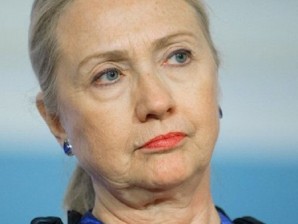ANNAPOLIS, Maryland — Secretary of State Hillary Clinton said Tuesday the United States was not seeking conflict with a rising China but urged emerging powers to act more “constructively” in the world.
As academics in China and elsewhere increasingly speak of US decline, Clinton offered a robust defense of the United States and said it still had the military power, innovative companies and core values to make it “exceptional.”
But addressing aspiring military leaders at the US Naval Academy, Clinton said bluntly that 2012 “is not 1912, when friction between a declining Britain and a rising Germany set the stage for global conflict.”
“We are not seeking new enemies. Today’s China is not the Soviet Union. We are not on the brink of a new Cold War in Asia,” Clinton told the academy in Annapolis, Maryland.
“A thriving China is good for America, and a thriving America is good for China — so long as we both thrive in a way that contributes to the regional and global good,” she said.
Clinton acknowledged concerns overseas about US intentions but denied that the United States was bent on “denying rising powers their fair share” or on bringing them into “a rigged system” designed to preserve US power.
But Clinton said that rising Asian powers — naming China, India and Indonesia — have been able to prosper thanks to an international system supported by the United States.
“Some of today’s emerging powers in Asia and elsewhere act as selective stakeholders, picking and choosing when to participate constructively and when to stand apart from the international system,” she said.
“While that may suit their interests in the short term, it will ultimately render the system that has helped them get to where they are today unworkable. And that would end up impoverishing everyone,” Clinton said.
The United States has frequently voiced concern that China, despite its rising wealth and ambitions, has not taken the role of a leading power on tough issues such as North Korea, Iran and climate change.
Clinton conceded that many Americans faced “difficult” economic times but said that there was “simply no substitute” for the United States in Asia and around the world.
“Only the United States has the global reach, the resources and the resolve to deter aggression, rally coalitions and project stability into diverse and dynamic regions of danger, threat and opportunity,” Clinton said.
“There is no real precedent in history for the role we play or the responsibility we have shouldered. And there is also no alternative,” she said.
Echoing a frequent theme from President Barack Obama’s administration, Clinton called for “strong rules and norms” globally and pledged an active US role in Asia’s emerging institutions.
Clinton pointed to November’s East Asia Summit in Bali, where Obama pushed forward discussion of the conflict-ridden South China Sea despite Beijing’s hopes to keep the issue off the table.
“Trying to settle complex disputes like this bilaterally, one-on-one, was a recipe for confusion and even potentially confrontation,” Clinton said, voicing support for the “peaceful resolution” of
disputes.
Beijing and five other governments hold sometimes overlapping claims in the South China Sea, through which about half of the world’s merchant fleet tonnage passes each year.
As Clinton was speaking, the Philippines, a US ally, said that its flagship navy vessel was involved in a standoff with two Chinese surveillance ships.
In a widely noted recent essay, Wang Jisi, one of China’s top experts on the United States, said that Beijing’s mistrust of Washington was deepening in part because of US involvement on the South China Sea and other issues in Asia.
